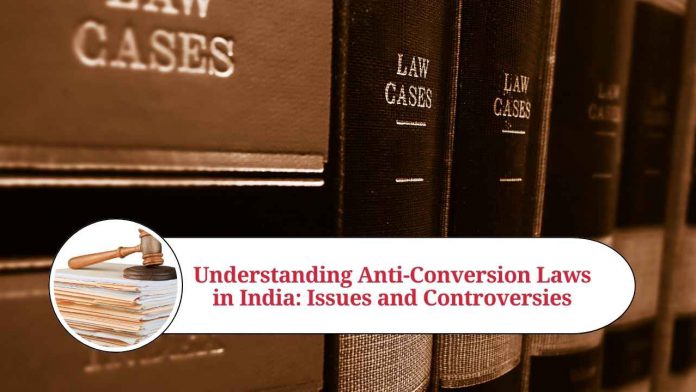Conversion is the process of changing one’s religious faith or belief. It is a sensitive issue in India where religious diversity is an integral part of the country’s social fabric. Anti-conversion laws have been passed in several states of India to regulate or restrict religious conversions. This blog post will provide an overview of what anti-conversion laws are, why they were enacted, their legal framework, and the controversies surrounding them.
What are Anti-Conversion Laws?
Anti-conversion laws are legal measures that regulate or restrict religious conversions. These laws are enacted to prevent forced or fraudulent conversions, which are considered unethical and illegal. The objective of anti-conversion laws is to protect the freedom of religion, prevent religious disharmony, and maintain social order.
History and Legal Framework of Anti-Conversion Laws
The first anti-conversion law was passed in 1967 by the state of Odisha. Since then, several states have enacted similar laws, which are commonly known as Freedom of Religion Acts. These laws are based on Article 25 of the Indian Constitution, which guarantees the right to freedom of religion. However, the Constitution also permits the state to regulate religious activities for the sake of public order, morality, and health.
Under anti-conversion laws, religious conversions can be challenged if they are done through force, fraud, or inducement. The burden of proof is on the person alleging the conversion to prove that it was not done voluntarily. Violators of the law can face imprisonment and fines.
Controversies Surrounding Anti-Conversion Laws
Anti-conversion laws have been a subject of controversy in India. Critics argue that these laws are often misused to target religious minorities and violate the right to freedom of religion. They also claim that these laws are discriminatory and unconstitutional as they only regulate conversions from one religion to another and not from one sect to another within the same religion.
Supporters of anti-conversion laws, on the other hand, argue that they are necessary to prevent forced or fraudulent conversions, which are often linked to religious extremism and violence. They also claim that these laws protect the vulnerable and marginalized sections of society from being exploited.
Another issue with anti-conversion laws is that they are often misused to target religious minorities, particularly Christians and Muslims. These laws have been criticized for being discriminatory and creating an atmosphere of fear and intimidation for those who wish to convert to another religion voluntarily.
In recent years, there have been several cases where anti-conversion laws have been used to harass and intimidate individuals who were converting to Christianity. These incidents have caused concern among human rights organizations and religious groups.
Moreover, anti-conversion laws are often poorly drafted, leaving scope for misinterpretation and misuse. For instance, the use of the term “inducement” is often vague and subjective, and it is not always clear what constitutes an inducement to convert. This ambiguity can lead to false accusations of forced or fraudulent conversions.
On the other hand, supporters of anti-conversion laws argue that they are necessary to prevent forced conversions, which are often linked to religious extremism and violence. They also claim that these laws protect vulnerable and marginalized sections of society from being exploited by religious organizations.
Conclusion
In conclusion, the issue of anti-conversion laws in India is complex and controversial. While there is a need to prevent forced conversions, it is essential to ensure that the right to freedom of religion is protected. Any laws regulating or restricting conversions must be drafted carefully to prevent misuse and protect the rights of all individuals. It is crucial to strike a balance between religious freedom and social order.
Read more useful content:
Frequently Asked Questions (FAQs)
What are anti-conversion laws in India?
Anti-conversion laws are legal measures that regulate or restrict religious conversions. These laws are enacted to prevent forced or fraudulent conversions, which are considered unethical and illegal.
What is the legal framework for anti-conversion laws in India?
Anti-conversion laws are based on Article 25 of the Indian Constitution, which guarantees the right to freedom of religion. However, the Constitution also permits the state to regulate religious activities for the sake of public order, morality, and health.
Which states in India have anti-conversion laws?
Several states in India, including Odisha, Madhya Pradesh, Arunachal Pradesh, Chhattisgarh, Gujarat, Himachal Pradesh, Jharkhand, and Uttarakhand, have enacted anti-conversion laws.
What are the penalties for violating anti-conversion laws in India?
Violators of anti-conversion laws can face imprisonment and fines. The exact penalty varies from state to state.
Can a person voluntarily convert to another religion in India?
Yes, a person has the right to voluntarily convert to another religion in India. However, the conversion must be done without force, fraud, or inducement.
Are anti-conversion laws in India constitutional?
The constitutionality of anti-conversion laws in India has been a subject of debate. While some argue that these laws are necessary to prevent forced conversions, others believe that they violate the right to freedom of religion.
Who can challenge a conversion under anti-conversion laws in India?
Under anti-conversion laws, a conversion can be challenged by anyone who alleges that it was done through force, fraud, or inducement.
Can a person convert from one sect to another within the same religion under anti-conversion laws in India?
Anti-conversion laws in India only regulate conversions from one religion to another and not from one sect to another within the same religion.
How are anti-conversion laws enforced in India?
Anti-conversion laws are enforced by the state government and local authorities.
Are anti-conversion laws in India effective in preventing forced conversions?
The effectiveness of anti-conversion laws in preventing forced conversions is a subject of debate. While some argue that these laws are necessary to prevent forced conversions, others believe that they are often misused to target religious minorities and violate the right to freedom of religion.




















